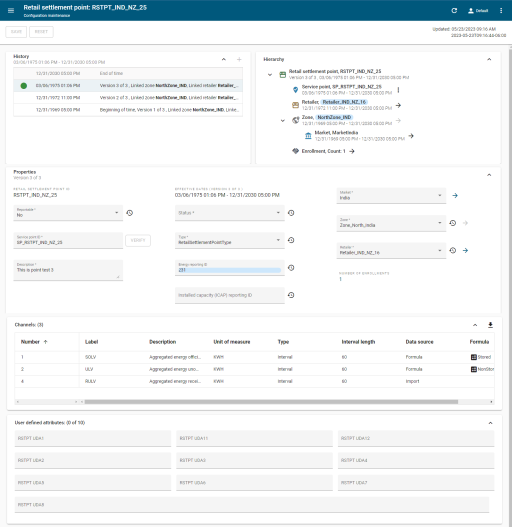Configuration maintenance: Retail settlement point ID
When performing a Retail settlement point entity Search, the Configuration maintenance: Retail settlement point ID page displays data for the retail settlement point ID and allows you to view and edit the retail settlement point entity configurations to support settlements. The retail settlement point ID displays in the page header.
Example of a Configuration Maintenance Retail Settlement Point ID page:

By default, the History, Hierarchy, and Properties panels are expanded and the Channels and User defined attributes panels are collapsed. Users can change which panels are expanded and collapsed. The configuration settings are retained until modified.
Tip: Bookmark this page for easy access.
The interface consists of the following panels:
-
Configuration maintenance: Retail settlement point hierarchy
-
Configuration maintenance: Retail settlement point properties
-
Configuration maintenance: Retail settlement point user defined attributes (UDAs)
The page supports the following actions:
-
To save changes made to the configuration, click Save.
-
To reset the configuration to the prior settings, click Reset.
-
To correct the retail settlement point ID, select Action menu (
 ) in the page header and select Correct ID. In the dialog that appears, the current retail settlement point ID is shown, type the correct ID in the box, and then click Save.
) in the page header and select Correct ID. In the dialog that appears, the current retail settlement point ID is shown, type the correct ID in the box, and then click Save.Note: The corrected ID must contain a minimum of two characters and a maximum of 100. Only alphanumeric and underscore characters are allowed.
-
To delete the retail settlement point ID, select Action menu (
 ) in the page header and click Delete. In the dialog that appears, select Yes. When the retail settlement point ID has been deleted, the New Configuration page will appear.
) in the page header and click Delete. In the dialog that appears, select Yes. When the retail settlement point ID has been deleted, the New Configuration page will appear. -
To download the configuration file for the retail settlement point that displays on the page, select Action menu (
 ) in the page header and click Download. The file will be downloaded to your browser's download folder.
) in the page header and click Download. The file will be downloaded to your browser's download folder.
Note: All changes made to the configuration are logged in the Audit log (with the user credentials and time stamp), and can be viewed from the Audit Log window.